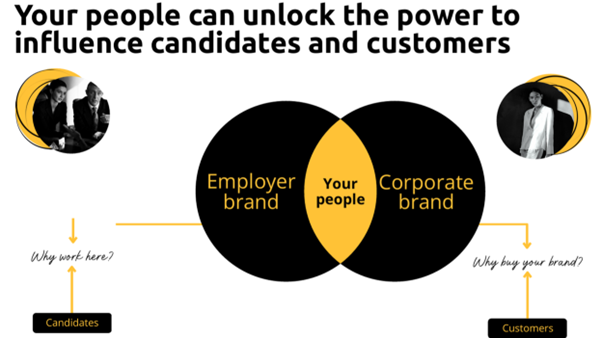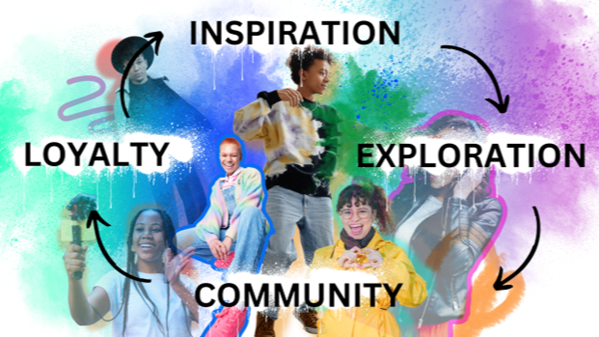Your EVP's Work pillar is stuck on mute (and it's costing you talent).

When we build EVPs, we organise them around five Dimensions - the areas candidates actually want to know about: Organisation, Work, Career, Wellbeing and Culture.
What I often see is companies will readily share stories about benefits, purpose and culture...but Work, the actual work people will do, is stuck on mute. A bullet point. "Challenging projects" or "cutting-edge technology" with no substance behind it. It's a massive, missed opportunity.
We're at an inflection point
The fundamental building blocks of work are being redesigned. We're moving from jobs to tasks. From roles to skills. From "here's your job description" to "here's the work that needs doing - and we're deciding what stays human and what doesn't." AI and automation are forcing us to ask: What work should humans actually do? What work is worth protecting as human? What skills will that work require? The workforce is being reconstructed in real-time. And if you're not explicitly communicating about the work itself - what it is, why it matters, what makes it human - you may be less relevant to the talent who are asking exactly these questions.
What focusing on 'Work' actually tells You
When you unpack the Work Dimension properly, you're not just describing tasks. You're revealing everything about your business:
What skills can people learn? Not loose 'professional development' buzzwords - specific, valuable skills that come from doing this work.
Who will they do the work with? What kind of people? What expertise? What energy?
What impact will the work have? Not aspirational guff - real outcomes that matter.
How will results be measured? What does success look like? What gets recognized and rewarded?
How stable is this work? In a world where work is being redesigned constantly, what's the shelf life of this role? What's adaptable?
If you can't answer these questions clearly, your EVP isn't just weak on the Work pillar. It's exposing that you haven't actually been intentional about the work to be done and why.
Hidden benefit: better hiring
When you force yourself to articulate the 'work to be done' clearly - at the task and skill level - it fundamentally changes how recruiters and hiring managers think about talent.
The old way: "We need someone with 5+ years in this specific role, using this specific tech stack, from this type of company."
Result? A tiny talent pool. Confirmation bias etc etc
The new way: "Here's the work that needs doing. Here are the skills required. Now - who might have these skills?"
Suddenly, your options explode:
• An experienced practitioner from the expected background? Sure.
• Someone with adjacent skills from a different industry? Absolutely.
• An internal candidate ready to stretch into new work? Why not.
• Someone at a different life stage rebuilding their career? Could be perfect.
Focusing on work - the actual tasks and skills - opens up your talent pipeline in a skills-short market.
It shifts the conversation from "find me someone who looks like this" to "find me someone who can do this work." That's more human, more valuable and more intentional.
Are you looking at the right data?
Most EVPs treat Work as a given. "Of course people know what the work is - it's in the job description."
But there's a deeper problem: market research – the reports often cited in EVP projects, doesn't tell the whole story.
Big surveys often ask people to rank what's most important in their careers. You get quantitative data. People tick boxes. And lo and behold, compensation comes out on top. True Maslovian spirit - we all need to put food on the table.
Organisations pour resources into comp benchmarking, benefits packages, and wellbeing programs. All good. All necessary.
But when you actually talk to people - when you sit with candidates as a recruiter, when you listen in employee conversations - you hear something different.
• People are anxious about whether their skills will stay relevant.
• They want to know if the work will be interesting or soul-crushing.
• They're wondering if the business is agile or if their ideas will die in layers of bureaucracy.
• They want to know: will I actually be productive here, or will I be stuck in meetings about meetings?
Fundamentally, people want to be productive. They want to do work that matters and see it have impact.
I see this all the time - sometimes it masquerades behind different data points in surveys. "Career development" might really mean "will I learn skills that keep me employable?" "Culture" might really mean "can I actually get work done here?"
If you only look at high-level survey data, you miss what's actually sitting at the centre of people's concerns: often, the work itself.
Job descriptions are artifacts of the old model. They list responsibilities and requirements. They don't reveal what the work actually is, why it matters, or what makes it compelling.
And in a world where:
• Work is being unbundled and redesigned
• Skills are the new currency
• People are asking "what work stays human?"
• AI is rewriting entire categories of tasks
...you can't afford to be vague about the work anymore.
The organisations that articulate work clearly - that make it a genuine pillar of their EVP, not an afterthought - will attract people who actually want to do that work.
Everyone else is just hoping their employer brand is shiny enough to distract from the fact that candidates have no idea what they'd actually be doing.
What this looks like in practice
I am suggesting you get specific:
Instead of: "Work on cutting-edge technology"
Try: "You'll be building AI-assisted diagnostic tools that help doctors catch diseases earlier. The work involves prompt engineering, testing edge cases with real users, and making ethical calls about where AI should assist vs. where humans must decide. You'll learn practical AI implementation and see your work in hospitals within months."
The difference is pretty obvious and can give you months of fresh content to use!
The uncomfortable question
If you stripped away your EVP content about perks, gatherings and purpose - and just described the work - would anyone want to do it?
If the answer is no, your problem isn't your EVP. It's your work design.
If the answer is yes, but you're not communicating it clearly, you might be leaving some of your biggest competitive advantage on the table.
So, what now?
The Work pillar isn't optional. It's not something you can gloss over with vague statements about "meaningful projects" or "innovative challenges."
Work is being redesigned. Workforces are being reconstructed. Talent is asking: "What work will I actually do, and is it worth doing?"
If you can't answer that clearly - at the task level, at the skill level, with real substance - you're invisible to the people who would be most energized by your work.
And if you can answer it, you've just unlocked a hiring advantage that most of your competitors are ignoring entirely.
The organisations that lead won't just have great culture or compelling purpose.
They'll have Work worth doing - and they'll know how to talk about it.
Why your Employer Value Proposition won’t fix your trust issues (and what will).



